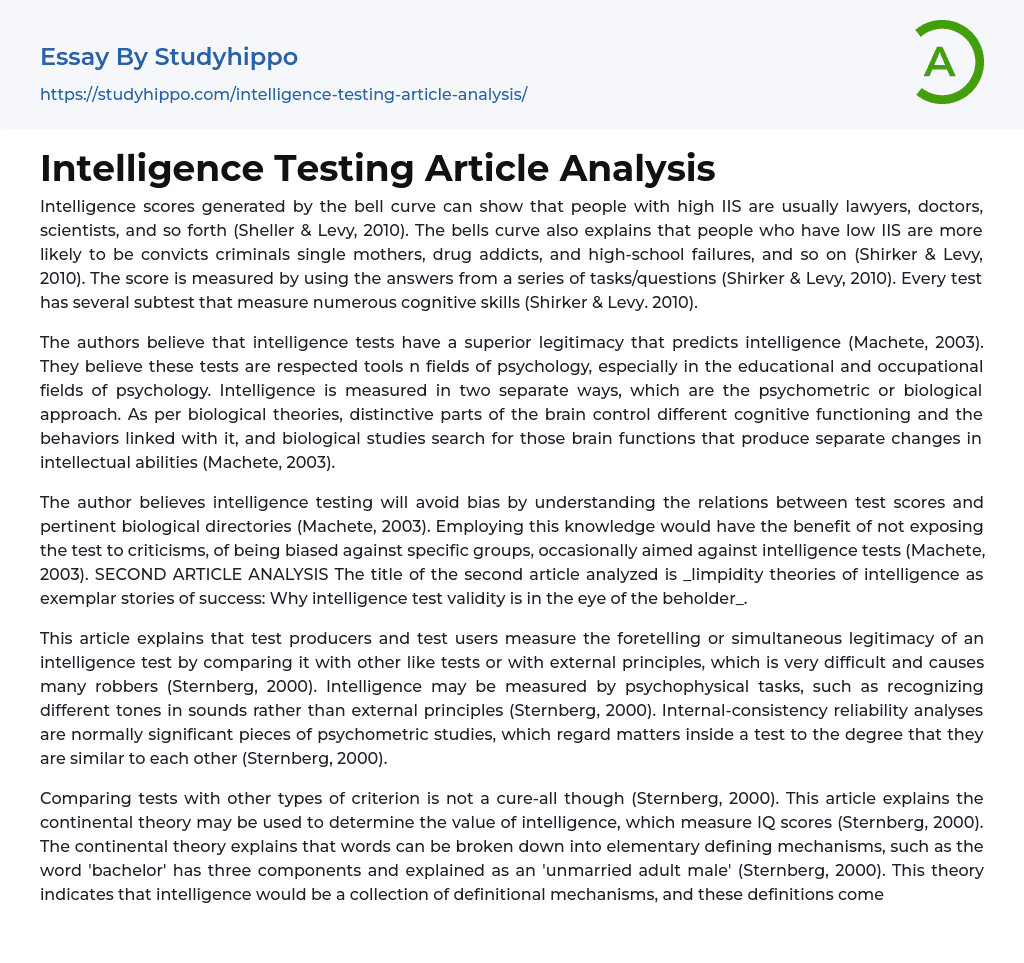According to Sheller & Levy (2010), individuals with high IIS scores, as indicated by the bell curve, often have professions such as lawyers, doctors, and scientists. Conversely, those with low IIS scores are commonly associated with criminality, single motherhood, drug addiction, or academic failure. The measurement of these scores involves completing a series of tasks/questions consisting of multiple subtests that evaluate different cognitive skills (Shirker & Levy, 2010).
Machete (2003) states that intelligence tests hold significant credibility in predicting intelligence and are highly respected in psychological fields like education and occupation-related fields. There are two approaches to measuring intelligence: the psychometric approach and the biological approach. The biological approach suggests that distinct parts of the brain control different cognitive functions and corresponding behaviors. Biological studies aim to identify these brain functions that contribute t
...o variations in intellectual abilities (Machete, 2003).
To ensure fairness and reduce bias in intelligence testing, Machete (2003) suggests considering the relationship between test scores and relevant biological indicators.
In his article "limpidity theories of intelligence as exemplar stories of success: Why intelligence test validity is in the eye of the beholder," Sternberg (2000) explores the challenges of assessing an intelligence test's predictive or concurrent validity by comparing it to similar tests or external standards. Instead, he proposes that measuring intelligence through psychophysical tasks, such as distinguishing different tones in sounds, may yield more effective results. Evaluating internal-consistency reliability is important to determine how closely related items within a test are to each other. However, solely relying on comparisons with other criteria does not provide a complete solution. According to Sternberg (2000), the continental theory can be employed to ascertain the valu
of intelligence and measure IQ scores. This theory breaks down words into fundamental defining mechanisms, like 'bachelor' being defined as an 'unmarried adult male' with three components. According to Sternberg (2000), intelligence is explained as comprising definitional mechanisms acquired through adaptation to cultural surroundings.In their study, Shirker and Levy (2010) argue that intelligence encompasses reasonable thinking, decisive actions, overcoming challenges, and adapting to different cultures. They also acknowledge the connection between intelligence and cognition as well as cognitive development, which leads to variations in intelligence across cultures. It has been observed that IQ test scores can significantly differ among various cultural groups, with African Americans often scoring lower (p.147). It is crucial to distinguish between intelligence itself and intelligent behavior. Intelligence refers to a psychological process that can enable or limit certain behaviors, which may vary across cultures (Shirker & Levy, 2010). Different cultures have diverse perceptions of what constitutes intelligence; something considered intelligent in one culture may not be regarded the same way in another (Shirker & Levy, 2010). Therefore, it is essential to recognize the differences among cultures; what is seen as intelligent in one culture may be viewed as unintelligent in another and vice versa. Intelligence tests are commonly used to assess an individual's 'Q' by assigning a numerical score. IQ represents the cognitive processes involved in problem-solving and goal achievement, which can differ across cultures (Shirker & Levy, 2010). The Akers test measures IQ scores through a series of tasks/questions completed by individuals (Shirker & Levy, 2010). Various theories exist for measuring IQ scores.The connection between test scores and relevant biological factors across different cultures can be better understood by studying
biological theories (Machete, 2003). The value of intelligence can be determined by breaking down words into fundamental defining mechanisms, as explained in the continental theory (Sternberg, 2000). Different researchers have diverse ideas about the standard behaviors that are used to evaluate the accuracy of an intelligence test (Sternberg, 2000). References on this topic can be found in the works of Machete, G. (2003) and Sternberg, R. J. (2000).
- Consciousness essays
- Intelligence essays
- Mindset essays
- Perception essays
- Problem Solving essays
- Resilience essays
- Addiction essays
- Anatomy and Physiology essays
- Biodegradation essays
- Cancer essays
- Dental Care essays
- Disability essays
- Disease essays
- Disorders essays
- Health Care essays
- Infectious Disease essays
- Inquiry essays
- Intelligence Quotient essays
- Lung Cancer essays
- Medicine essays
- Neurology essays
- Nutrition essays
- Olfaction essays
- Physical Exercise essays
- Public Health essays
- Sex essays
- Women's Health essays
- World health organization essays
- Measure essays
- Nursing Profession essays
- Psychometrics essays
- Why Did You Choose Nursing essays
- Why I Want to Be a Nurse essays




